Fall Out

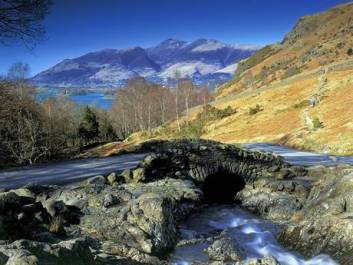 How ironic that Nick Clegg decided to come out in favour of Nuclear Power (with a slightly muted side order on how much he loves fracking), the same weekend as we learned that Cumbria is again to be considered as the site for a massive nuclear waste store. How can this be, when the proposal was dismissed, on geological and a slew of other grounds, just eight months ago? Simples! Our government (cf horizontal drilling) is going to change the rules. And go on changing the rules, for as long as it takes, I presume. If you're interested, there's a comprehensive round-up of why the proposal keeps getting thrown out here:
How ironic that Nick Clegg decided to come out in favour of Nuclear Power (with a slightly muted side order on how much he loves fracking), the same weekend as we learned that Cumbria is again to be considered as the site for a massive nuclear waste store. How can this be, when the proposal was dismissed, on geological and a slew of other grounds, just eight months ago? Simples! Our government (cf horizontal drilling) is going to change the rules. And go on changing the rules, for as long as it takes, I presume. If you're interested, there's a comprehensive round-up of why the proposal keeps getting thrown out here:http://www.davidsmythe.org/nuclear/planning%20inquiry.htm
But it's a tough situation. Last winter, when I went looking, I swiftly discovered that the chief "unbiased blogger" supporting the Wasdale scheme was Sellafield's press officer in a different hat. Shock, horror? Not really, not even blameworthy, really. What's an industry to do? The waste is there, it has to go somewhere. It's not going to go away. Okay, so bury it under Sellafield, right there on the rather unattractive seaside! It looks like the elegant solution. But perhaps not, considering what's happening at the seaside at Fukushima right now... I'm not fanatically opposed to nuclear power. Really, I'm not. I'd be cautiously receptive to the idea of thorium reactors: except I'm not in favour of massive investment in a new, doom-laden fossil fuel start-up, instead of investing in the future. It's just that the industry's difficulties seem so hopelessly recalcitrant, after sixty years of trying. Can't even get rid of the government subsidies: can't even begin to stand on its own feet... Ask yourself, why is the political "Western World" so slap bang convinced that Iran is on the road to building nuclear weapons? Because the leaders of the "Western World" know fine well that as long as you have two sticks to rub together in the way of other energy sources, nuclear stinks. It's only good for one thing: Weapons Of Mass Destruction.
& I think Nick Clegg knows that as well as I do.
 Gabriel was down at the weekend. Ginger and I spent some of Sunday watching him play Fall Out "America's First Choice In Post-Nuclear Simulation". Just like old times, when it used to be Counterstrike. We hunted Deathclaws at Quarry Junction, we helped a couple of young lovers to hook up, we dealt with some giant ants and turned the solar power generators back on at I forget where. It was good fun: a Final Fantasy type RPG at heart, but I think I'll stick with Zelda. Under the surfaces, nothing much has changed. I watched the background, this parched, cruelly impoverished environment that the kids take for granted. There's a strong founding father element in game creation, chunks of code that turn up over and over, appearing on your screen as wooden crates, railway sidings, rusted metal sheds; vaguely identifiable South West Seaboard US cityscapes: but that doesn't completely explain it. Why are the games so sure?, I wondered, somewhat spooked. The Apocalypse mooted in Fall Out isn't seriously "Nuclear". It could just as well have been Zombie Plague that did the damage. "Nuclear" is a convention, a shorthand. It covers a lot of things, the intractable truth about how we got where we are now. What we see ahead, and how poor in solutions we find ourselves.
Gabriel was down at the weekend. Ginger and I spent some of Sunday watching him play Fall Out "America's First Choice In Post-Nuclear Simulation". Just like old times, when it used to be Counterstrike. We hunted Deathclaws at Quarry Junction, we helped a couple of young lovers to hook up, we dealt with some giant ants and turned the solar power generators back on at I forget where. It was good fun: a Final Fantasy type RPG at heart, but I think I'll stick with Zelda. Under the surfaces, nothing much has changed. I watched the background, this parched, cruelly impoverished environment that the kids take for granted. There's a strong founding father element in game creation, chunks of code that turn up over and over, appearing on your screen as wooden crates, railway sidings, rusted metal sheds; vaguely identifiable South West Seaboard US cityscapes: but that doesn't completely explain it. Why are the games so sure?, I wondered, somewhat spooked. The Apocalypse mooted in Fall Out isn't seriously "Nuclear". It could just as well have been Zombie Plague that did the damage. "Nuclear" is a convention, a shorthand. It covers a lot of things, the intractable truth about how we got where we are now. What we see ahead, and how poor in solutions we find ourselves.Binging on Breaking Bad
I'm starting to feel as if I'm in an eating competition. Thank God these people show no sign of getting LOST, but they're spreading what they have fairly thin. Why does the product have to be so staggeringly pure, btw? I mean, right down on the street like it is? I didn't think the drug industry worked like that. I know what she's going to do with some of it, saw it coming a mile off, but why doesn't Skyler (stupid name) just burn a stack of the dirty money? Nah, don't tell me. I'm ticking off my guesses, right and wrong, as we move into the home stretch: it's something to do.
Good News
On the High Court's decision about West Sussex CC's attempt to evict the Balcombe protestors, who will now be able to maintain their presence until the current planning permission runs out on the 28th September. And vindication for the anti-fracking movement, in reports of catastrophic damage to farming, esp livestock farming, in the USA; that are now reaching UK farmers. Our water, and now our food production. Leave aside all the rest. Will this be enough? The end of the threat? I very strongly doubt it. Fernhurst, Kidford and Wisborough are up next.
Revisiting Bold As Love
Eating out last night at the Eastern Eye for Maude's birthday, conversation with the young people gave me an update on the cold equations of being in a hot, cool, but unsigned rock band. I've promised to send Charlotte and Lizze, best friends of my friend's daughter, copies of the Ax, Sage and Fiorinda portraits. Oh no, my digital copies have become corrupt. I'll have to scan from the originals again, or get it done properly for me... Hoping they might be online somewhere (nope), I turned up this gem from 2011. Nothing to do with me, I swear.
little darling, it's been a long cold lonely winter...
Sadly, the graphic novel version of Bold As Love advertised by The Guardian in support of my review of Samantha Shannon's The Bone Season does not exist. What they have is just the US hardcover, with the Union Jack cover design (augh!), being sold by whoever bought the stock from the deceased Night Shade books. That's nothing to do with me, either.
I wonder how the fanbase (in so far as there is one) will take to Aoxomoxoa at forty five. If I ever publish, that is.
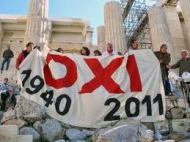 But what was it like in modern Greece, 2013, you'll be asking. Surely that's the real story. Protests? People coping with the Economic Crisis? Nazi gangs? Were you affected? Yes and no. We heard some sad stories. Trouble brushed by us, probably more often than we knew. & we were in a strictly cash economy all right. Nobody wanted to see a credit card. But having credit line problems is one thing: grinding poverty is another and often invisible, same as in the UK. The rich were carrying on regardless, far as we could tell.
But what was it like in modern Greece, 2013, you'll be asking. Surely that's the real story. Protests? People coping with the Economic Crisis? Nazi gangs? Were you affected? Yes and no. We heard some sad stories. Trouble brushed by us, probably more often than we knew. & we were in a strictly cash economy all right. Nobody wanted to see a credit card. But having credit line problems is one thing: grinding poverty is another and often invisible, same as in the UK. The rich were carrying on regardless, far as we could tell. As tourists with a hired car we were removed from the harsh underbelly of the recovery. The tourist towns were struggling, no doubt about it. The tour-buses still rolled into Delfi, but nobody in town was getting much of a taste & it was like that everywhere. As for Golden Dawn, we were keeping well away from Athens and that, I admit, was part of the plan. We, personally never had any trouble. But now, the news this week from Athens, just when I was thinking of how to frame this necessary coda: the murder of Pavlos Fissas, brave man, that's such bad news. The scenes of Far-Right vs Communist street-fighting. So eerily familiar, is this the nineteen thirties?: so close to my own fiction: such a chilling re-enactment game being played out in the real world. Can't think what more to say.

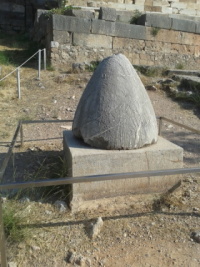
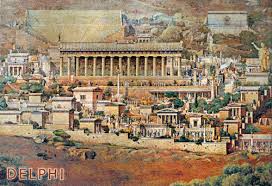
 You were required to wash your hair in the Castilian Spring before you consulted the Pythia. Byron jumped right in. You couldn't do that now, the pool is dry (says everything about Delfi). But you can fill a bottle, from a gutter where the water runs under the fence. It's cold and good. When Alexander tried his luck, wanting to know whether he would conquer the world, the priestess refused to say anything, until he dragged her off her hallucinogenic gas-vent by the hair, at which she shrieked You are unconquerable!, and Alexander said "I have my answer." Absolutely typical Delphic utterance: she got him good, haha, as he wasn't strictly conquered, he died of typhoid. The more you look into it, the more you wonder why anybody ever paid for this service. Why not just come to Delfi and hang out in the wine shop: pick up on the information exchange less twisted out of shape and on the cheap? I suppose, actually, that's what most people did.
You were required to wash your hair in the Castilian Spring before you consulted the Pythia. Byron jumped right in. You couldn't do that now, the pool is dry (says everything about Delfi). But you can fill a bottle, from a gutter where the water runs under the fence. It's cold and good. When Alexander tried his luck, wanting to know whether he would conquer the world, the priestess refused to say anything, until he dragged her off her hallucinogenic gas-vent by the hair, at which she shrieked You are unconquerable!, and Alexander said "I have my answer." Absolutely typical Delphic utterance: she got him good, haha, as he wasn't strictly conquered, he died of typhoid. The more you look into it, the more you wonder why anybody ever paid for this service. Why not just come to Delfi and hang out in the wine shop: pick up on the information exchange less twisted out of shape and on the cheap? I suppose, actually, that's what most people did. 
 Another day, almost our last day in Greece, in the Sacred City of Messolonghi, Peter finally rebelled. He'd had enough of my latest wild goose chase, wanted to know why we had to stop for ten minutes, let alone spend the night, in this dump, flat as a pancake, sickly, glaring hot, unfriendly, nothing to see but a dreary great lagoon with litter bobbing at the shore; totally devoid of attractive features... I blame myself. To me it was so obvious that Messolonghi had to feature on the Roumeli tour, I'd forgotten to explain what we were doing. I'd also forgotten to give my patient companion proper warning that even I wasn't expecting to like the place, and he probably was not going to like it either. Maybe I'd been hoping that Messolonghi would beat the critics, but August is not its best month. This flat modern town is the reverse of picturesque, the downtown area is the only place on our whole trip where I felt a foreign woman should be uneasy alone, and there was a cockroach in the shower. Okay, the roach was dead, always the best kind, but even so...
Another day, almost our last day in Greece, in the Sacred City of Messolonghi, Peter finally rebelled. He'd had enough of my latest wild goose chase, wanted to know why we had to stop for ten minutes, let alone spend the night, in this dump, flat as a pancake, sickly, glaring hot, unfriendly, nothing to see but a dreary great lagoon with litter bobbing at the shore; totally devoid of attractive features... I blame myself. To me it was so obvious that Messolonghi had to feature on the Roumeli tour, I'd forgotten to explain what we were doing. I'd also forgotten to give my patient companion proper warning that even I wasn't expecting to like the place, and he probably was not going to like it either. Maybe I'd been hoping that Messolonghi would beat the critics, but August is not its best month. This flat modern town is the reverse of picturesque, the downtown area is the only place on our whole trip where I felt a foreign woman should be uneasy alone, and there was a cockroach in the shower. Okay, the roach was dead, always the best kind, but even so...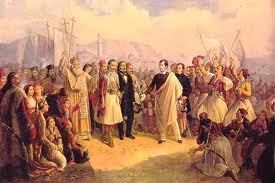
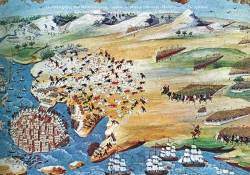
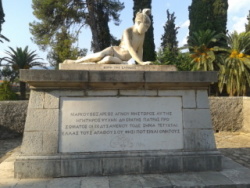 the miniature cricket bat signed by a Notts County team; among other curious treasures. We made peace, walking in the quiet green Garden of Heroes, where the Philhellenes are buried, and found ourselves a better hotel. I think the naked young girl on
the miniature cricket bat signed by a Notts County team; among other curious treasures. We made peace, walking in the quiet green Garden of Heroes, where the Philhellenes are buried, and found ourselves a better hotel. I think the naked young girl on 
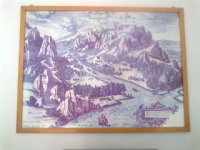 We left Guesthouse Euridiki very early on St Paraskevi's day. Goodbye to our hostess, and her quiet husband. Goodbye the cool, hushed lobby with the ranked preserves and the craft goods nobody bought; goodbye Elia's Corner. By ten thirty we'd reached Sacred Dion, at the foot of Mount Olympus. One more Macedonian city, but not an architect designed show-off from the World Domination years, like Pella: a city that just grew, the way proper cities ought, around the national shrines. A lovely, unexpected place. The ruins, mostly Graeco-Roman, first century CE, inhabit a shady wetland, hopping with bright green frogs. The deities, Demeter, Zeus, Afrodite, have been replaced (effigies of effigies) just as they were found: small, not gigantic, presiding over the dragonflies. In the museum where the originals are kept we saw portrait statues of ordinary bourgeois, men and women, neither royal nor divine (that's Rome for you), and a beautiful, remarkably well preserved "hydraulis": water-powered harmonium for public entertainments. The silent movie cinema had not survived.
We left Guesthouse Euridiki very early on St Paraskevi's day. Goodbye to our hostess, and her quiet husband. Goodbye the cool, hushed lobby with the ranked preserves and the craft goods nobody bought; goodbye Elia's Corner. By ten thirty we'd reached Sacred Dion, at the foot of Mount Olympus. One more Macedonian city, but not an architect designed show-off from the World Domination years, like Pella: a city that just grew, the way proper cities ought, around the national shrines. A lovely, unexpected place. The ruins, mostly Graeco-Roman, first century CE, inhabit a shady wetland, hopping with bright green frogs. The deities, Demeter, Zeus, Afrodite, have been replaced (effigies of effigies) just as they were found: small, not gigantic, presiding over the dragonflies. In the museum where the originals are kept we saw portrait statues of ordinary bourgeois, men and women, neither royal nor divine (that's Rome for you), and a beautiful, remarkably well preserved "hydraulis": water-powered harmonium for public entertainments. The silent movie cinema had not survived.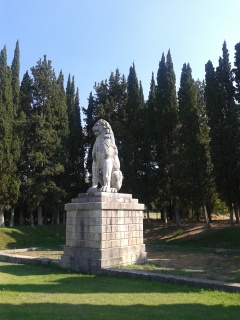 Reports differ, maybe some of the lovers survived; maybe the Thebans paid for the lion, and Philip and Alexander just graciously allowed them to honour their dead. But still, lost for centuries, dug up by Ali Pasha (he couldn't get it transported to Ioannina), admired by Byron in its fallen glory, the white lion has been restored, patched together and replaced on its pedestal. It stands in the middle of a green lawn where the Theban Band are buried, surrounded by cypress trees. It's a very nice lion. We liked it a lot. "This is the end of the Philip of Macedon trail," I told Peter. "The end of what he did to Greece, anyway." And we stayed there for a while. Nobody else came by.
Reports differ, maybe some of the lovers survived; maybe the Thebans paid for the lion, and Philip and Alexander just graciously allowed them to honour their dead. But still, lost for centuries, dug up by Ali Pasha (he couldn't get it transported to Ioannina), admired by Byron in its fallen glory, the white lion has been restored, patched together and replaced on its pedestal. It stands in the middle of a green lawn where the Theban Band are buried, surrounded by cypress trees. It's a very nice lion. We liked it a lot. "This is the end of the Philip of Macedon trail," I told Peter. "The end of what he did to Greece, anyway." And we stayed there for a while. Nobody else came by.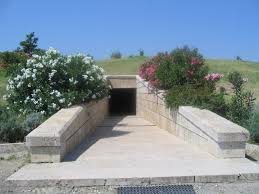 Vergina is a single work art-show, for the present. The Royal Palace, extensive and tantalising, is closed for refurbishment. All you can see is the tombs. The museum, what a brilliant idea, has been built on site, and a Tumulus mound raised over it: so that you enter, as the funeral processions would have done, via a sloping tunnel; into darkness, glimpsing the ghostly white sunken doors of the houses of the dead.
Vergina is a single work art-show, for the present. The Royal Palace, extensive and tantalising, is closed for refurbishment. All you can see is the tombs. The museum, what a brilliant idea, has been built on site, and a Tumulus mound raised over it: so that you enter, as the funeral processions would have done, via a sloping tunnel; into darkness, glimpsing the ghostly white sunken doors of the houses of the dead. 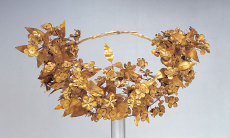 It didn't take long to walk around. Here are the famous, fabulously delicate gold wreaths, oak and myrtle. The silver and bronze vessels; the outsize bathing utensils for the funerary rites of a king. The metal parts of a king's dress armour (Philip wasn't a big man, apparently). A solid gold larnax ; funerary container, in which they found the charred fragments of a middle aged man's bones, wrapped in purple. A "queen's diadem".
It didn't take long to walk around. Here are the famous, fabulously delicate gold wreaths, oak and myrtle. The silver and bronze vessels; the outsize bathing utensils for the funerary rites of a king. The metal parts of a king's dress armour (Philip wasn't a big man, apparently). A solid gold larnax ; funerary container, in which they found the charred fragments of a middle aged man's bones, wrapped in purple. A "queen's diadem". 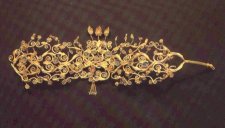 The tiny ivory portrait heads, recognisable as Philip and his son, from a chryselephantine dining couch. The tombs themselves, Philip's with the Doric facade, and the wonderful painted hunting scene above the door. The fascinating doll's house reconstructions: showing exactly what Manolis and his team saw, when they broke in, thirty years ago. The treasure of massive metal, jumbled anyhow; the imperishable gleam of gold.
The tiny ivory portrait heads, recognisable as Philip and his son, from a chryselephantine dining couch. The tombs themselves, Philip's with the Doric facade, and the wonderful painted hunting scene above the door. The fascinating doll's house reconstructions: showing exactly what Manolis and his team saw, when they broke in, thirty years ago. The treasure of massive metal, jumbled anyhow; the imperishable gleam of gold. 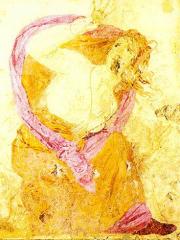 The Rape of Persephone is a true fresco, executed swiftly on wet plaster, with great freedom and virtuoso skill. The colours seem to be intact, and used sparingly. On the eastern wall, Demeter sits on a rock, as she is described in the Mysteries of Eleusis, exhausted and desolate. To her left, there's the abduction itself. It made the hairs stand on the back of my neck. There is nothing else like this. No other greek painting of this quality and completeness has survived, and yet I've seen that attendant nymph, looking so bewildered and dumbfounded, clutching the veil. She's in the young Cézanne's
The Rape of Persephone is a true fresco, executed swiftly on wet plaster, with great freedom and virtuoso skill. The colours seem to be intact, and used sparingly. On the eastern wall, Demeter sits on a rock, as she is described in the Mysteries of Eleusis, exhausted and desolate. To her left, there's the abduction itself. It made the hairs stand on the back of my neck. There is nothing else like this. No other greek painting of this quality and completeness has survived, and yet I've seen that attendant nymph, looking so bewildered and dumbfounded, clutching the veil. She's in the young Cézanne's  In the afternoon we walked around the fields, inspected the fatal theatre (all grass grown) and viewed the huge area of the Palace, closed off until at least 2017. Goats rambled, scarlet-skirted grasshoppers leapt onto us. We discussed the Pausanius story, the smoking gun and the grassy knoll and the obvious conclusion one must draw. There was a lot of handwaving at the time, about this poor disturbed young man, unjustly treated by his powerful lover; Philip's bad habit of playing his gorgeous bodyguards off against each other, etc etc. But there was CSI evidence that Pausanius had expected to get away with his crime of passion. That just doesn't make sense. Unless somebody (and there's really only one person who could have done this) had convinced him he'd survive. . . Peter spotted a wayside shrub bearing woody fruits; exactly the same little etched, ochre roundels we'd seen featuring in the funeral wreaths worn by the living, some of them found intact in 2,500 year old funeral debris. I looked it up, later. It's called the
In the afternoon we walked around the fields, inspected the fatal theatre (all grass grown) and viewed the huge area of the Palace, closed off until at least 2017. Goats rambled, scarlet-skirted grasshoppers leapt onto us. We discussed the Pausanius story, the smoking gun and the grassy knoll and the obvious conclusion one must draw. There was a lot of handwaving at the time, about this poor disturbed young man, unjustly treated by his powerful lover; Philip's bad habit of playing his gorgeous bodyguards off against each other, etc etc. But there was CSI evidence that Pausanius had expected to get away with his crime of passion. That just doesn't make sense. Unless somebody (and there's really only one person who could have done this) had convinced him he'd survive. . . Peter spotted a wayside shrub bearing woody fruits; exactly the same little etched, ochre roundels we'd seen featuring in the funeral wreaths worn by the living, some of them found intact in 2,500 year old funeral debris. I looked it up, later. It's called the 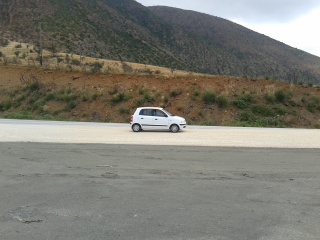 When I first planned this tour around the Roumeli, I imagined we'd use public transport: reliving the intimacy and the drama of our tour of Java and Sumatra in 1978. You have to get to know the people, and you have to speak the language, when you're stranded with a bunch of them at a houseless railway junction in black night, in the deepest, darkest Sumatran rainforest, and the scheduled bus doesn't turn up... (Don't try this today. The forest is gone, for one thing). But then I found out
When I first planned this tour around the Roumeli, I imagined we'd use public transport: reliving the intimacy and the drama of our tour of Java and Sumatra in 1978. You have to get to know the people, and you have to speak the language, when you're stranded with a bunch of them at a houseless railway junction in black night, in the deepest, darkest Sumatran rainforest, and the scheduled bus doesn't turn up... (Don't try this today. The forest is gone, for one thing). But then I found out 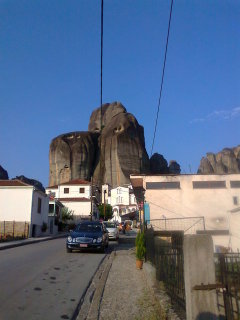 this extraordinary landscape. The pioneer was apparently St Athanasius, riding on the back of an eagle. The labyrinthine Orthodox lamaseries that followed were constructed and supplied by rope and tackle. In living (tourist) memory it was still quite an adventure to get access. Today, fierce and squalid isolation is no more. There are stairways. Custodians take your money, dispense natty monochrome pareos for decency if necessary, and conduct you to the dark, livid, painted sancturaries, every niche and corner teeming with inventive means of execution. The paintings at Ayiou Nikolau Anapafsa, work of a Cretan, a contemporary of El Greco are far and away the best. The tiny 9th century painted cathedral down in the town is worth the lot of them: unless you're just here for the thrill of peering off the edge of a sheer, 100+ metre drop, and imagining you might fall. Not many people stay.Coachloads upon coachloads of devout Russians, Bulgarians, Romanians, process up the precipitous single track road, pour off their buses, climb the stairs, obsessively venerate every icon in sight, pour back onto their buses and do the same at the next lamasery along. At 3 euros a pop, this operation must be a regular goldmine.
this extraordinary landscape. The pioneer was apparently St Athanasius, riding on the back of an eagle. The labyrinthine Orthodox lamaseries that followed were constructed and supplied by rope and tackle. In living (tourist) memory it was still quite an adventure to get access. Today, fierce and squalid isolation is no more. There are stairways. Custodians take your money, dispense natty monochrome pareos for decency if necessary, and conduct you to the dark, livid, painted sancturaries, every niche and corner teeming with inventive means of execution. The paintings at Ayiou Nikolau Anapafsa, work of a Cretan, a contemporary of El Greco are far and away the best. The tiny 9th century painted cathedral down in the town is worth the lot of them: unless you're just here for the thrill of peering off the edge of a sheer, 100+ metre drop, and imagining you might fall. Not many people stay.Coachloads upon coachloads of devout Russians, Bulgarians, Romanians, process up the precipitous single track road, pour off their buses, climb the stairs, obsessively venerate every icon in sight, pour back onto their buses and do the same at the next lamasery along. At 3 euros a pop, this operation must be a regular goldmine.  Tuesday 3rd September, light cloud, light breeze: feeling cooler. Trying to encourage happy thoughts and positive energy in the world, when all I hear is bad news, I've decided to list some of my favourite things of the moment. In no particular order, so take no notice of the numbers, it's just a convention.
Tuesday 3rd September, light cloud, light breeze: feeling cooler. Trying to encourage happy thoughts and positive energy in the world, when all I hear is bad news, I've decided to list some of my favourite things of the moment. In no particular order, so take no notice of the numbers, it's just a convention. speaking greek. Except to yell BEAVER! once (rather surprising announcement!) at which the two musk rats who'd been calmly watching our approach from the bank very swiftly took themselves off... Never mind, I love kayaking, & it was very peaceful and nice. The Penduline Tits were ace too. Their nests are really cool. (
speaking greek. Except to yell BEAVER! once (rather surprising announcement!) at which the two musk rats who'd been calmly watching our approach from the bank very swiftly took themselves off... Never mind, I love kayaking, & it was very peaceful and nice. The Penduline Tits were ace too. Their nests are really cool. (